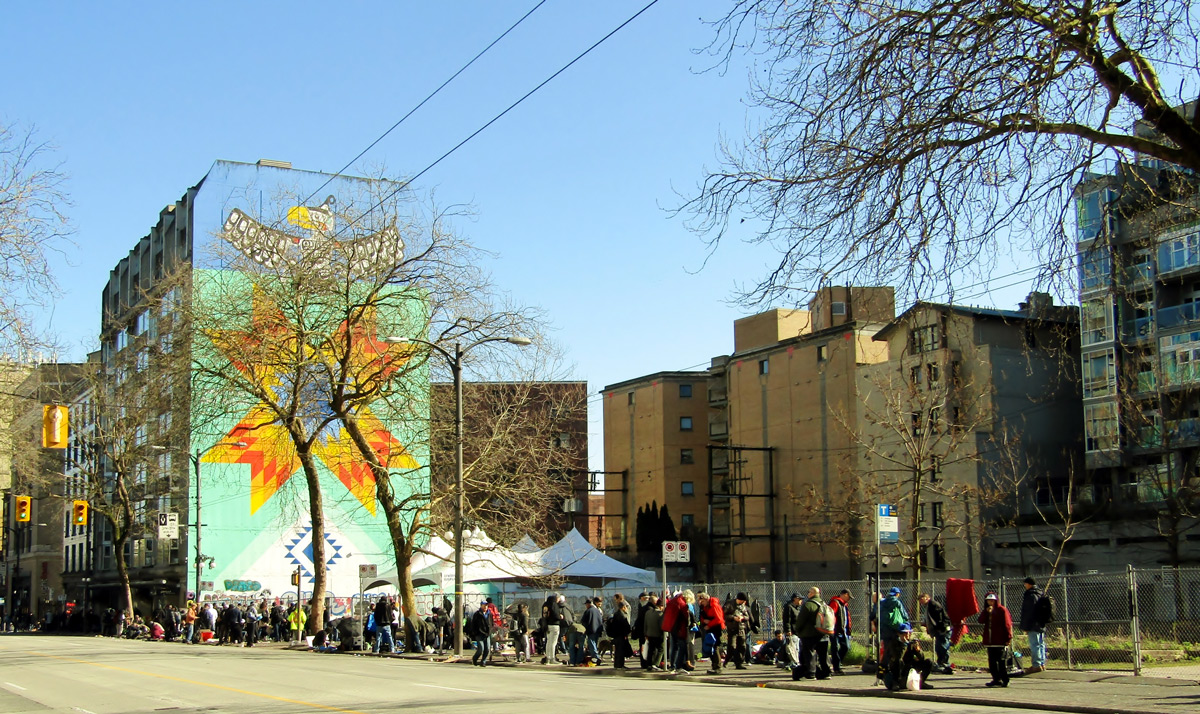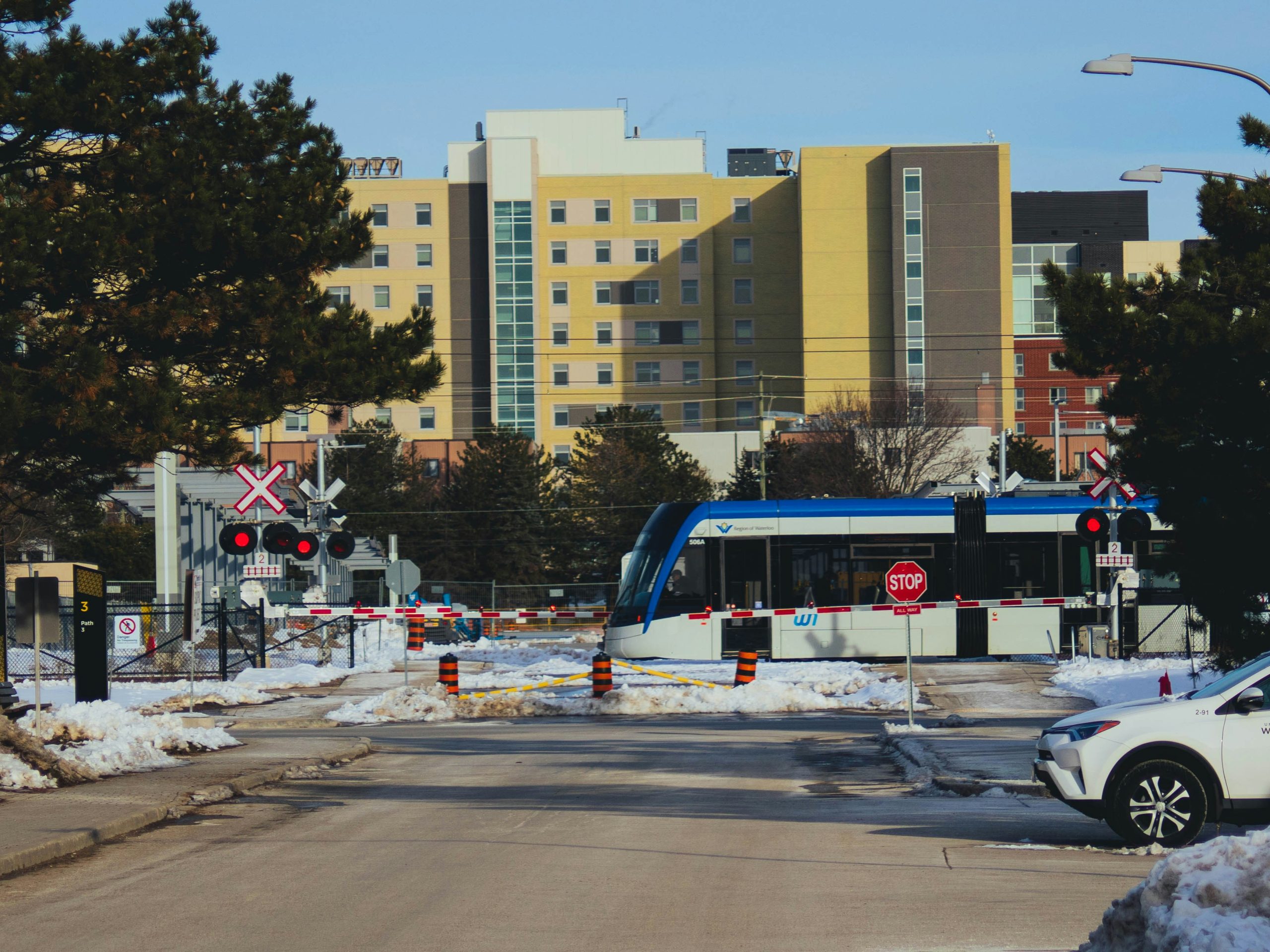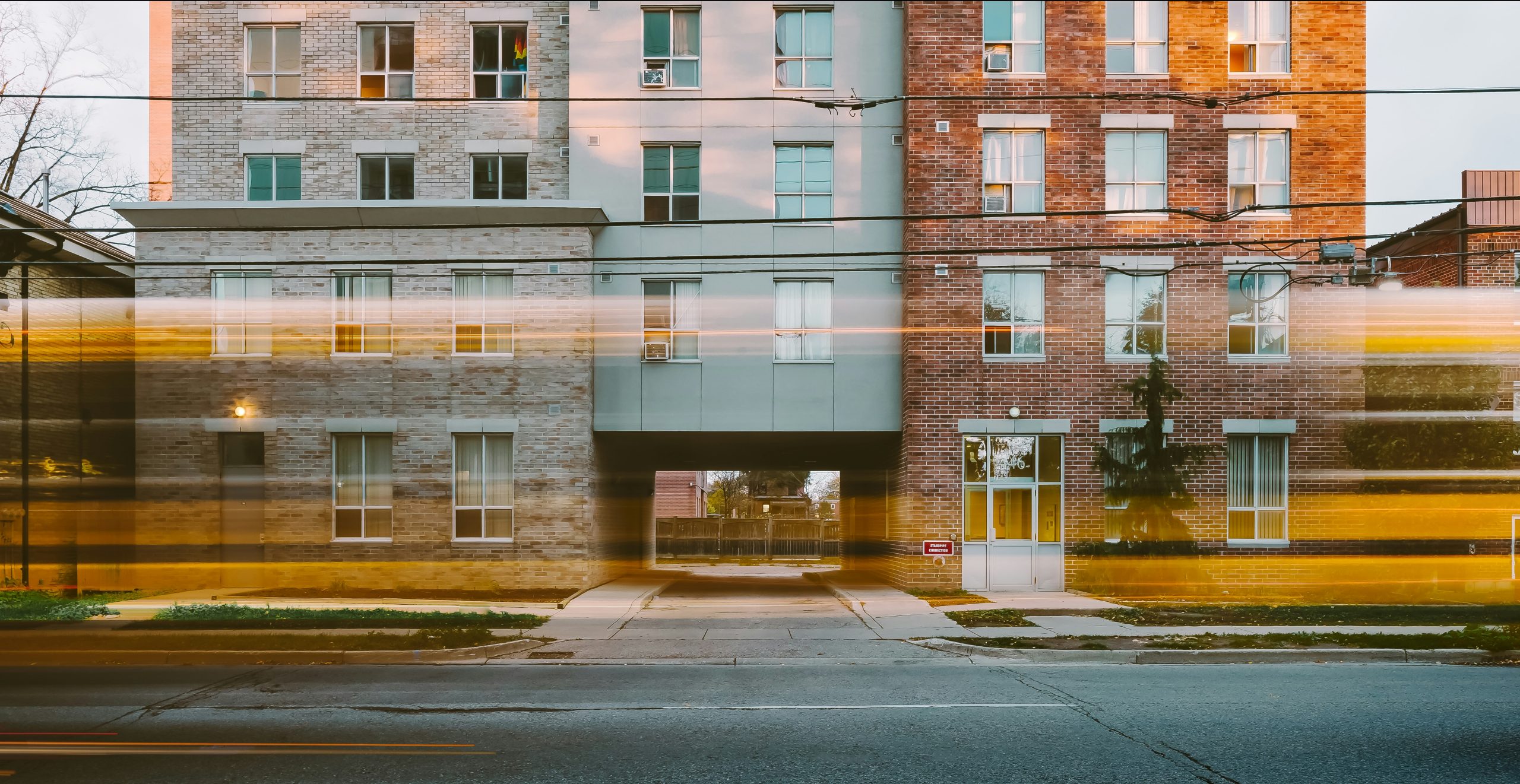Featured Guest
You’ll find this guest among our growing roll of Urban Champions.
-

Tim Richter
Founder, President & CEO, Canadian Alliance to End Homelessness
-

Margaret Pfoh
CEO, Aboriginal Housing Management Association
-

Leilani Farha
Global Director, Make the Shift
-

John van Nostrand
Founding Principal, SvN
5 Key
Takeaways
A roundup of the most compelling ideas, themes and quotes from this candid conversation|
Additional Reading
& Resources
1. Housing is a human right
With stay at home orders being implemented in cities of all sizes, it has become apparent that housing is the front-line of defense against COVID-19. Over the last 30 years, we have lost sight of every person’s right to adequate and safe shelter, and have instead allowed housing to become a commodity that can be traded for profit. The resulting loss of the social value of housing has laid bare the dire public health consequences, with thousands of Canadians, unable to simply “shelter in place”
2. Housing advocacy is the next profession
A holistic, 360-degree view of Canada’s housing crises and the relatively recent “explosion” of “modern, mass homelessness” is required to fix this fundamental human right. We have to look at housing and homelessness in its entirety, and not fixate on the built form as the only solution. A multi-pronged approach that incorporates a variety of social, political and architectural actions is required to address the complexities inherent in finding a long-term solution. One panelist suggested we may need to create a new professional category: housing advocate.
3. What’s the difference between ventilators and housing? Nothing!
A collaborative response that transcends jurisdictions is required to take immediate action on homelessness and housing. The federal government stepped into the provincial domain of health when it was most needed, to source and distribute ventilators. And the same heroics are needed for solving the housing crises – which is currently in the provincial domain. All (jurisdictional) hands on deck!
4. No going back
COVID-19 exposed existing deficiencies and structural inequities in urban and social infrastructure. Yes, we need an effective emergency response to address the needs of our most vulnerable citizens. But we cannot risk going back to the way things were – with too many people living homeless, underhoused, home-precarious or dispossessed. The housing crises is the result of systemic policy decisions and directives, from all levels of government. And it has shaken the underpinnings of the very foundation of otherwise, resilient communities. It’s time for all jurisdictions to work together, but this time with front line workers and those with lived experience to address this gaping vulnerability, once and for all.
5. Just do it
We all know that cities are dealing with layers upon layers of human tragedy: the opioid crises, homelessness and domestic violence. And the list goes on, and sadly, continues to build. And they all tie back to housing precarity. Enough is enough. The COVID-19 crises has shown us that we can overcome extraordinary obstacles quickly, and effectively. We must be “brave and fearless” in our collective commitment to solving the housing crises that affects every city in Canada. In a reference to Tracy Chapman, one panelist suggested that we might be “talkin’ bout a revolution” — where governments are pushed, and the people and the non-profits are empowered.
|
Push (documentary), Fredrik Gertten, WG Films
Fragile Freedoms, Thomas R. Berger, Clarke, Irwin
Sweat Equity, C.A. Sharpe and A.J. Shawyer, ISERBooks
Aboriginal Housing Management Association
Housing Now Virtual Public Meeting on 705 Warden Proposal, Wednesday May 13, 6-7pm
Full Panel
Transcript
Note to readers: This video session was transcribed using auto-transcribing software. Manual editing was undertaken in an effort to improve readability and clarity. Questions or concerns with the transcription can be directed to events@canurb.org with “transcription” in the subject line.
Full Audience
Chatroom Transcript
Note to reader: Chat comments have been edited for ease of readability. The text has not been edited for spelling or grammar. For questions or concerns, please contact events@canurb.org with “Chat Comments” in the subject line.
12:01:10 From Abby S to All panelists: Hi Mary! Super City Talker reporting for duty!
12:02:41 From Canadian Urban Institute: covidresponse@canurb.org
12:02:52 From Sue Hallatt, CUI Staff: @ Abigail – Hey SCT!
12:03:17 From Canadian Urban Institute: #citytalk
12:03:54 From Canadian Urban Institute: Folks, please change your settings to “all panelists and attendees” so everyone can see your comments.
12:04:53 From Canadian Urban Institute: to find recordings or transcripts of today’s webinar please go to canurb.org/citytalk
12:05:09 From Canadian Urban Institute: #citytalk
12:05:37 From Andre Darmanin to All panelists: Going in and out of Zoom sessions from Vaughan ON
12:05:38 From Susan Fletcher: Margaret Pfoh — on the golf course!!!! <3
12:06:20 From Emily Wall, CUI Staff: Today’s panel:
Leilani Farha – https://twitter.com/leilanifarha
https://twitter.com/Make_TheShift
https://www.unhousingrapp.org/the-shift
Margaret Pfoh – https://twitter.com/ahma_bc
https://www.ahma-bc.org/ahma
Tim Richter – https://twitter.com/timrichter
https://twitter.com/CAEHomelessness/
John van Nostrand – https://www.parceldevelopments.com
12:07:25 From Melinda Munro to All panelists: Love that description – COVID is a particle accelerator.
12:07:56 From Mary Huang: are there any efforts to harness public willingness to direct some investment via community fun
12:08:17 From Mary Huang: fund or bond for hosuing solutions
12:13:49 From Irena Kohn: Aboriginal Housing Management Association https://www.ahma-bc.org/
12:13:56 From Mark Richardson: Just as a heads-up to all the GTA folks on this call, there is a Virtual Public-Meeting on WED. MAY 13th for the City of Toronto’s HOUSING NOW proposal for the huge Parking-Lot at WARDEN subway station. We would appreciate it if those advocating for “more affordable-housing units” could participate in that meeting / feedback process. https://twitter.com/housingnowto/status/1257321990802649088?s=21
12:14:26 From Andre Darmanin to All panelists: Thanks Mark
12:14:45 From Melinda Munro to All panelists: agree – heroic efforts of front line organizations who are coping with the existing crises. Preventing outbreaks.
12:16:02 From Irena Kohn: Canadian Alliance to End Homelessness https://caeh.ca/vision-mission/
12:16:05 From Thea Karlavaris: Great, thank you for the info Mark!
12:17:52 From Abby S: I would love someone on your panel to weigh in on Mayor Tory’s initiative for modular housing.
12:18:59 From Abby S: Were landlords allowed to evict? Not the main issue, but I thought there was a moratorium on residential evictions.
12:19:21 From Michael Aziz: Well said, Leilani.
12:21:43 From Walter Rogers to All panelists: I am listening and watching from London Ontario. Many of our homeless are now in hotels for social isolation due to virus. City is discussing post COVID and purchasing a building but would be interested in panel thoughts of wrap around services to make this investement a success
12:21:58 From Felipe Senisterra: “the home is the biggest line of defense against an outbreak” – very well put
12:22:37 From Andre Darmanin: I would like to know the panelists thoughts former AirBnb hosts are putting their former properties on the long term housing market and the potential of them kicking tenants out again once it’s safe to do so again? That is my worry.
12:23:20 From Nezahat Turegun: Very smartly said, Leilani!
12:23:33 From John Ryerson to All panelists: So much yellow belt but NIMBY sops housing density
12:23:51 From Sue Hallatt, CUI Staff: @walter – please repost to All panelists
12:25:31 From Andrew Smith: On John’s point, ‘Sweat Equity: Sharpe and Shawyer’, great read on the co-op housing history and experience in Newfoundland and Labrador
12:26:05 From Andre Darmanin: Do you have a link @andrew? Thanks
12:26:21 From Dean Fisher to All panelists: I was wondering if we could say to the condo builders, for every 10 units you are permitted to build you must build one unit for the homeless. So if they build 1,000 units, you must build 100 units and donate them to the city. Is that feasible?
12:26:40 From Samantha Mark: There are hidden homelessness that also occurs beyond the cities… as resulting from the same systemic policy gaps to address housing as a right
12:26:45 From Michael Aziz: Any correlation to electoral cycles, Tim?
12:27:34 From Abby S: Migration to cities?
12:28:00 From Andrew Smith: Andre, sold on-line through a quick search, Amazon etc.
12:28:57 From Shona de Jong: keen to have panelists address the Fed Govt CIRNAC/ISC accountability to homelessness/ housing insecurity for Indigenous people/First nations off reserve
12:28:59 From Melinda Munro to All panelists: Thank you Tim for that insight – we fixate on the housing form and not on the systems that create the mass modern homelessness
12:29:14 From Katrina Chaves to All panelists: I moved here from Detroit and was involved in affordable housing development for the City primarily through public private partnerships. I saw very strong local leadership across the board for promoting affordability as well as a diversity of financing tools esp. from public sector, and strong involvement from all three levels of gov. Recognizing that Canada has a different system, would like to hear about what funds are being made available to roll out affordable housing on a large scale.
12:30:08 From Jesse Jenkinson to All panelists: I have heard developers say that affordable housing is not profitable, and therefore they are unlikely to choose to provide it in any significant way. Is John able to speak to this issue? What is the incentive for developers to build affordable housing (in addition to a moral obligation to take care of fellow people)?
12:30:29 From Canadian Urban Institute: Welcome, new joiners! Just a reminder to change your chat settings to “all panelists and attendees’ so we can all see your comments. Thanks!
12:30:41 From Abby S: In Toronto it took Covid-19…it wasn’t done before!
12:30:46 From Samantha Mark: Covid-19 is calling out the need for a re-do along governance – multi-ordinal collaborative based approaches to governance
12:31:05 From nrinder nann to All panelists: 63% of jobless as a result of pandemic, are women. Compound with loss of childcare options, women’s economic precarity has increased, and more and more women led households are about to lose their homes. Housing security is critical. Policy perspective needs to fast track affordable housing supply over condos.
12:31:13 From Mary Huang: hidden homeless of people couch surfing. i was shock to learn someone I met rents out her studio apartment 6 months in summer and lived in her car since she could not afford the apartment year am
12:31:47 From Mary Huang: any data on hidden homeless stats
12:32:14 From Olusola Olufemi to All panelists: There is no one size fit all solution to address the problem of homelessness. Homelessness is ‘a pandemic’ that has been complicated even more by the COVID-19 pandemic. For the street homeless, street, under the bridge, alleyways and all those marginal spaces in the city is their home. They have no place to call a home therefore it becomes to practice “stay home wash hands” etc instructions. They are always more vulnerable to any and every disaster. They street homeless are hit hard!
12:32:21 From Melinda Munro to All panelists: jurisdictional issues is red herring – hear, hear
12:32:34 From Samantha Mark: Mary, in a study we did on Indigenous homelessness outside of urban areas in Saskatchewan found situations similar to what you share above.
12:32:55 From Andre Darmanin: Yes @samantha. There has to be a redo of governance as well as org structures post COVID. The question is that will Canadian leaders want to do this?
12:33:48 From Andrew Bond to All panelists: Adequate emergency responses to covid for people experiencing homelessness are going to concretely establish the pivot point and link to durable change. Health care and social service supports are front and centre in leading this with our shelter and housing colleagues
12:34:13 From Abby S: @andre is the motivation to build modular housing to address the problem or is there a more cynical reason in terms of stopping the spread…not about housing pre se…a frightening thought that means it is not going to last.
12:35:07 From Angie Hocking: AMEN SISTER
12:35:07 From Andrew Bond to All panelists: Let’s make sure health care orgs are centred in their responsibilities on this. We are doing this across the country and CNH3 are supporting this push.
12:35:25 From Duncan Maclennan: more than most other rich countries higher order governments use the constitution as an excuse to pass the problem to local scales from whom tax resources have been removed and are not replaced by housing programmes.
12:35:33 From David Welwood: Totally agree. CMHC built housing after World War 2 on a grand scale – they can do it again!
12:36:19 From Abby S to All panelists: Is there a call in option?
12:36:31 From Abby S to All panelists: for john?
12:36:37 From Adrienne Pacini to All panelists: Agreed that there are new possibilities through the pandemic — many of these invisible parts of the system are becoming visible. Totally agree that leadership will be the key to actually translating some of those leverage points in the system into actual opportunities.
12:36:52 From Gloria Venczel: 2 things-#1 nature will not allow us to leave people behind as homelessness will ensure future pandemic waves #2 economic inequity, ie, gig economy, will ensure that people will continue to opt out of the “social contract” and not follow civil society rules for covid like social distancing. This speaks to the very foundation of our democracy.
12:36:56 From Andre Darmanin: @abby The modular housing is temporary. I wouldn’t be cynical about it.
12:37:01 From Abby S: That’s the question of will
12:37:03 From John Ryerson to All panelists: Isn’t the jurisdictional problem with conservative provincial governments picking up the operating costs and services?
12:37:08 From Mark Richardson: Just FYI – the CMHC Annual Public Meeting is this afternoon at 1:30 PM – https://twitter.com/cmhc_ca/status/1255565187467358216?s=21
12:37:31 From Andrew Bond to All panelists: Hospitals are also starting to needy in housing in Canada, in the states leading health care orgs are doing similar. This is not ever to replace but to augment housing as healthcare for those needing clinically enhanced supportive housing
12:37:35 From Mark Guslits to All panelists: Tim, great David Letterman beard look.
12:37:43 From Sharon Irven to All panelists: Maybe John should participate by chat?
12:37:47 From Abby S: @andre…but will it be used as transitional..what John spoke of…rather than dismantled.
12:37:58 From Jenna Dutton to All panelists: Adaptive re-use – Calgary has very high amount of office space that is sitting empty
12:38:25 From Abby S: The fact is…it was built very quickly…but it took Covid vs simply the crisis of homelessness itself. That’s my cynicism. (or worry)
12:38:29 From Sharon Irven to All panelists: To Tim: how many were rehoused after Alberta floods? missed %
12:39:06 From Andre Darmanin: @abby I’m not sure what will happen post-COVID. maybe you are right that it will be transitional and not really serve Housing first principles.
12:39:54 From Graham Wilson: Subdividing rural lands will only help those rich enough to afford it, and will fragment agricultural land and threaten environmentally protected land. There’s lots of urban land closer to services which won’t create more infrastructure and autodependency issues
12:39:55 From Lorne Cutler to All panelists: How much of the rebuilt housing in Calgary was paid for by insurance and how much by the government?
12:39:55 From Abby S: @andre…that would be better than dismantling wouldn’t it? Or will is provide an excuse to stop there?
12:39:59 From Andre Darmanin: Because what will happen to the homeless who really need the help. it has to be a combination of transitional and helping the homeless.
12:40:12 From Abby S: @yes
12:40:19 From Abby S: @andre- uyes
12:40:21 From Andrew Bond to All panelists: Let’s keep focused on the unique and terrible moment of covid as a specific moment to respond to as unique historically to accelerate ending homelessness. we need to not just double down on our existing ideas but how this unique moment allows this.
12:40:27 From Andre Darmanin: @abby Agreed.
12:40:36 From Tim Richter to Sharon Irven and all panelists: Everyone but about 2000 that were in downtown shelters
12:40:49 From Abby S: @margaret-yes exactly
12:40:57 From John Ryerson to All panelists: The Mayor of Toronto has refused for years to declare an emergency for homeless that would bring the kind of response Tim referred too in Calgary
12:40:58 From Andrew Bond to All panelists: specific strategy needs to emerge from the specific nature of covid or we will lose this opportunity
12:41:17 From Luigi Ferrara: The homeless problem is complicated by many factors such as mental health issues and lack of family tissue and connection to community. Homeless is a complex problem like a pandemic and it requires a systemic response and a crisis management approach as Tim has suggested.
12:41:18 From Andre Darmanin: Let’s continue this @abby.
12:41:29 From Sean Gadon: Thoughts of the panel given that emergency shelter standards have to permanetly change to provide longer term physical distancing than what existing system provides? The country’s shelter along with long-term care systems are in crisis!
12:41:34 From Adrian Nandez to All panelists: we can also ilnclude food and energy security into the comprehensive design/policty/etc that COULD/SHOULD come out of this pandemic
12:41:42 From Angie Hocking: What is your stance on the safety of the shelter systems during the pandemic? In Toronto, the general public thinks that people on the street are being offered apartments/hotels by Streets To Homes and folks are turning them down, however, most are being offered a spot in the shelters only. Can a 50 person shelter actually be a safe option during this time? (All signs point to no from health and safety perspective in my opinion)
12:41:57 From Mary Huang: i heard cmhc had trouble getting NHS funds out
12:42:05 From Andre Darmanin: No one has discussed racial equity and its relationship with housing (or I missed it)
12:42:09 From Emily Wall, CUI Staff: Please help CUI improve its CityTalk programming with a short post-webinar survey – https://bit.ly/2zT6Bb5
12:42:47 From Andre Darmanin: Hi @sean. can you answer @abby’s question about the modular housing and what will happen to it post-COVID.
12:43:44 From Andre Darmanin: @abby Sean Gadon is a recently retired City of Toronto Director of Housing.
12:43:55 From TADESSE KEBEBE to All panelists: is there anyone who may something on disability vs homelessness, and vulnerability to COVID?
12:43:56 From Sean Gadon: Toronto’s modular housing is to be permanent for up to 50 year’s
12:44:11 From Melinda Munro to All panelists: @andre Margaret talked about the impacts on indigenous people and indigenous women, but yes, more needs to be said about equity impacts by race, gender, age
12:44:23 From Andrew Bond to All panelists: the pandemic has established that shelters cannot provide adequate health,safety and security. we need to build he rudiments of a ‘new supportive housing’ as the lowest possible ‘rung’ of the housing ladder. build it now and fast and furiously, then never let it go backward
12:44:54 From Abby S: @sean does each unit hold individual kitchen/washroom or are those shared?
12:44:56 From Andrew Bond: oops!
12:45:41 From Abby S: @Leilani AHHHHHHHH
12:45:43 From Sean Gadon: self contained units with real keys!
12:45:49 From Mary Ellen Glover to All panelists: vancouvers modular housing are self contained suites approximately 320 sq foot
12:46:21 From Abby S: @sean so not like the ones in Oakland that have deteriorated and are unsafe (they share porta-Potties but have a place to sleep. Not a good situation.
12:46:43 From Diane Dyson: Jurisdiction and economics are two central barriers thrown up around housing. Happy to see @DuncanMaclennan weighing in on this chat as he’s done some great international comparative on this.
12:46:43 From Sean Gadon: Exactly not like Oakland!
12:46:47 From Dianne Himbeault: The private sector also has to be held accountable, this situation shows that their wealth is built upon a house of cards, our precarious economic system falls apart when the 99% suddenly can’t pay their rent and buy their goods – need support for more tax equity and a living wage – will they see that it is in their best interest to have a functioning economy
12:47:00 From Andre Darmanin: Happy to See @sean and @diane here.
12:47:09 From Abby S: And it all returns to vulture capital…and how to stop it
12:47:10 From Andrew Bond: Summary:1.Adequate emergency responses to Covid for people experiencing homelessness
12:47:11 From Shona de Jong: can someone pls provide link to the CMHC Annual Public Meeting is this afternoon at 1:30 PM – not seeing it on this link https://twitter.com/cmhc_ca/status/1255565187467358216?s=21
12:47:16 From Gloria Venczel: Heads up- while modular housing is an immediate solution- they will stay in place for the next 20 years at least. Big caveat re: modular housing- we tried to warehouse poor people in the 1960’s without mixed use amenities + employment opportunities like cafes + corner stores that create safe public spaces to meet your neighbours in places like the former Regent Park in Toronto and Pruit Igo in St Louis. They were huge failures as architecturally, in form and programming, people couldn’t get to know each other and build trust and community. No one will invite a complete stranger into their living room until they have built up trust in a safe, local public space. Humans have evolved as a social species that do not function al all without culturally appropriate architecture to facilitate safe, regular social contact. Pruit Igo was blown up after 25 years. Regent Park has recently been demolished and gentrified.
12:47:26 From Katrina Chaves: Can panelists talk about the financing tools available for developing affordable housing?
12:47:33 From Mark Guslits: it does occur to me that, in this time of massive government spending in unprecedented amounts directed at food production, farming, industry, etc it would be a time to pour the massive funds across Canada necessary to “do it”
12:48:05 From Andrew Bond: Summary: Adequate emergency responses to Covid for people experiencing homelessness are going to concretely establish the pivot point and link to durable change. Health care and social service supports are front and centre in leading this with our shelter and housing colleagues
12:48:10 From Abby S: @Gloria…thank you. The issues you raised are what I could not articulate but am concerned about with modular housing.
12:48:27 From Melissa Ricci to All panelists: Funding is crucial for lower tier municipalities to implement housing strategies. Any ideas on what lower tier municipalities can do to advocate for this?
12:48:29 From Diane Dyson: Shoutout to Cindy Blackstock!
12:48:36 From Andrew Bond: Let’s make sure the health care orgs are centres in their responsibilities on this. We are doing this across the country and CNH3 are supporting thins push.
12:48:38 From Andre Darmanin: @gloria. I’m in a simulataneous Zoom discussion on rethinking density and the elite response to urbanism and housing, including Pruitt Igoe was discussed. Great that you raised it.
12:48:53 From Abby S: Emergency vs long term. And again is modular housing a response to covid or a response to homelessness…i don’t see them as one and the same
12:48:57 From Andre Darmanin: Break Down Silos NOW!
12:49:21 From Cheryll Case: amazing
12:49:25 From Karine LeBlanc: @andre to break down silos you must appeal to all of the silos. I don’t think one can impose coordination on others…
12:49:26 From Felipe Senisterra: Can the moderator/facilitator of this webinar keep this chat accessible for a few minutes following the discussion? There is lots of great depth and perspective within the chat discussion – lots to read and catch up on.
12:49:36 From Andrew Bond: Hospitals are also starting to invest in housing in Canada, in the states leading health care orgs are doing similar. This is not ever a replacement for housing but an augmentation to have clinically enhanced supportive housing for those in real need
12:50:03 From Abby S: @Andrew the need for wrap around services is critical
12:50:05 From Andre Darmanin: @karine. all parties must be involved for these important policy discussions.
12:50:10 From Shona de Jong: okay – found it https://www.cmhc-schl.gc.ca/en/about-cmhc/Management-and-Governance/Annual-Public-Meeting
12:50:25 From Andrew Bond: Let’s keep focused on the unique and terrible moment of Covid as a specific moment to respond to as a unique historical point to accelerate ending homelessness. We need to not just double down on our existing ideas but how this unique moment supports and enables this
12:50:26 From Andre Darmanin: Hey @cheryll
12:50:53 From Andrew Bond: Specific strategy needs to emerge from the specific nature of Covid to prevent losing an opportunity amidst this tragedy
12:51:07 From Mark Guslits: as Tim has stated, we can indeed address homelessness on a broad basis. With money! At the end of the day thats what is mainly missing. Housing is critically needed and massively expensive. Now is the time to roll it into all other critically important services…and fix it.
12:51:28 From Paulina Mikicich to All panelists: Agree that the commodification of housing must stop. However if there is a lack of political will perhaps convincing politicians/governments that housing all of our populations makes sound economic sense (reduces health care costs, enhances the economy etc.) is a start. Another approach could be to tie government funding to progress on social metrics (e.g. addressing homelessness)
12:51:31 From Andre Darmanin: Money for programs but also infrastructure.
12:51:40 From Sue Hallatt, CUI Staff: Fragile Freedoms, T Berger
12:51:43 From Sue Hallatt, CUI Staff: https://www.goodreads.com/book/show/2155305.Fragile_Freedoms
12:51:45 From Mark Guslits: absolutely
12:52:20 From Gloria Venczel: @Abby- serious concern around warehousing poor people yet again. Their housing should be integrated seamlessly into existing neighbourhoods, as they are part of our society, with amenities that provide public spaces where everyone can take pride and ownership of their environment.
12:52:21 From Andrew Bond: The pandemic has established that shelters cannot provide adequate health safety and security. We need to build the rudiments of a ‘new supportive housing’ as the lowest possible ‘rung’ of the housing policy ladder. Build it now fast and furiously! We are just starting to go that way right now in Toronto on the ground and we need to do it everywhere and never let this go backward afterwards
12:52:27 From nrinder nann: Housing precarity was growing prior to the pandemic. And now with 63% of jobless since pandemic being women, we are going to see more need every month without a eviction moratorium on city level. This pandemic is showing a reckoning of values and what action is required.
12:53:07 From Abby S: @nrinder that is frightening
12:53:20 From Emily Wall, CUI Staff: Please help CUI improve its CityTalk programming with a short post-webinar survey – https://bit.ly/2zT6Bb5
12:53:37 From Cheryll Case: Great points Leihlani!
12:54:31 From Alina Chatterjee to All panelists: Ditto that- great points- thanks Leihlani!
12:54:43 From John Ryerson to All panelists: Toronto keeps tearing down tents in response in part to the upscale condos downtown
12:54:45 From Angie Hocking: @Andrew Bond completely agree
12:54:48 From Emily Wall, CUI Staff to Felipe Senisterra and all panelists: Felipe we will keep the chat open for about 15 minutes after the talk is over. You can also check in on our CityTalk blog in a few days for the chat transcript, as well as a list of resources culled from the chat during this talk.
12:55:20 From Samira Farahani to All panelists: cumulation of non affordable prices through the period of time causes problem in housing.
12:55:41 From Adrian Nandez to All panelists: Is @ JOhn talking about ” pen city” Toronto? Did i get that right?
12:55:45 From Gloria Venczel: homelessness, like jails, is a philosophy of punishment, not rehabilitation. It costs $60K per year to treat a homeless person at ST. Paul’s hospital per year in Vancouver. Yes, homelessness is an ideological result.
12:55:48 From Samira Farahani: cumulation of non affordable prices through the period of time causes problem in housing.
12:55:52 From Abby S: Don’t we need the support of the health systems? the role that mental health supports play is an important one…
12:55:52 From Lisa Cavicchia, CUI Staff: Tent City
12:56:03 From Sue Hallatt, CUI Staff: @ Adrian – TENT city
12:56:05 From Julieta Perucca to All panelists: We need structural change. Structural change is practical change. We need to move forward with a Human Rights approach to housing.
12:56:15 From Mary Huang: cppib invest in several (7-8) blackstone funds not sure if any include real estste
12:56:26 From TADESSE KEBEBE to All panelists: money matters great
12:56:26 From Andre Darmanin: Agreed @abby SDH is critical in the policy decision making and development
12:56:37 From Julieta Perucca to All panelists: www.maketheshift.org
12:56:40 From Katrina Chaves: Why are there so few affordable housing developers in Canada relative to US?
12:56:49 From Sean Gadon: Guys looks like we are heading into a recession – so the housing agenda will become even more important as poor and marginalized groups will be hardest hit – as Tim said must talk about the people who need support.
12:56:50 From Andrew Bond: Please reach out to us at CNH3 and Tim at CAEH if you’re wanting to build healthcare supportive housing into the future of reimagining housing. Seamless integration, and healthcare providers and organizations will help bring the leverage to get the money needed for housing. Healthcare voices can be unbelievably strong if we can get ourselves aligned. Housing is healthcare, ‘value-based’ health policy requires the most efficient investments for health, and housing and basic income are the two most fundamentally powerful investments!
12:56:58 From John Ryerson: Is the problem to solve within the progressive bubble or finding language to broaden the political support – thinking of the 19th c “lazy” comment yesterday by a leader ?
12:57:16 From Emily Wall, CUI Staff: Please help CUI improve its CityTalk programming with a short post-webinar survey – https://bit.ly/2zT6Bb5
12:57:25 From Andre Darmanin: Agreed @Sean. re recession. housing and homelessness, as much as transit, will be critical.
12:57:32 From Mark Guslits: absolutely money would help. In the 80’s and 90’S when the feds and province were at the table, tens of thousands of new coops and non profits were built.
12:57:40 From Canadian Urban Institute: #citytalk
12:57:41 From Duncan Maclennan: great moral cases for permanent solutions made here, but there will be real fiscal difficulties after emergency so there needs to be much better evidenced cases for raising housing share vis a vis health, education etc.
12:58:10 From Irena Kohn: https://www.tvo.org/video/documentaries/push-feature-version
12:58:46 From Mary Huang: recession is a given. risk is closer to a depression since a number businesses are not going to survive
12:59:13 From Andre Darmanin: @katrina 👋🏾. We both were in the US. Different mindsets and leadership.
12:59:15 From Lorne Cutler: Governments spent a lot more in 80s and 90s until their deficits were so high (as well as inflation) and the government hit a debt wall. Did the government cut the right things in order to balance finances. That is up for debate and housing surely suffered but I can’ image any group agreeing to seeing their funding cut.
12:59:56 From Lorne Cutler: Are the U.S. tax free municipal bonds part of the solution?
12:59:58 From Canadian Urban Institute: Transcripts and recordings of this and all our webinars can be found at canurb.org/citytalk
13:00:03 From Mirella Palermo: Great conversation from everyone.- thank-you! #HousingRightFight
13:00:21 From Alina Chatterjee to All panelists: Yes, very useful and insightful- thank you!
13:00:29 From Mary Huang: might need to explore something similar to Montreal and their funds harnassing investment paying 5-6%.. non profit are sometimes paying close to that but jump through hoops
13:00:41 From Jonathan Giggs: Thank you for this important discussion
13:00:45 From Graham Wilson: Lots of mall parking lots could be a good place for “young towns” … no need to create new settlement areas far from services and jobs
13:01:04 From Andre Darmanin: @lorne. I raised bonds in a recent CUI discussion and that panel’s response was tepid. I’m all for bonds having seen them work while I was in LA.
13:01:07 From Andrew Bond: Helathcare makes up massive >40% of public budgets, value-based healthcare unlocks immense capital to elevate housing. Need the capital and power
13:01:11 From Emily Wall, CUI Staff: Please help CUI improve its CityTalk programming with a short post-webinar survey – https://bit.ly/2zT6Bb5
13:01:14 From Cheryll Case: 🎉
13:01:16 From Abby S: Malls are going to disappear…but privately owned…
13:01:18 From Abby S: But maybe
13:01:31 From Arash Oturkar to All panelists: Great talk, very insightful!
13:01:45 From Sean Gadon: Well done everyone!
13:01:45 From Abby S: Thank you Mary…these Talks fly by
13:01:52 From Graham Wilson: Thank you!
13:01:56 From Jenna Dutton to All panelists: Thank you!
13:01:56 From Erika Morton: Thanks and with you all in seeing systems change as a result of the pandemic.
13:01:58 From Andre Darmanin: add me to Linkedin (Andre Darmanin) and/or Twitter @andredarmanin
13:02:01 From Arash Oturkar to All panelists: City of Toronto is now working on modular housing, will be interesting to see how it goes.
13:02:04 From Abby S: Yes thank you to the panelists for your work
13:02:09 From Raza Jafri to All panelists: we would love to help. if there is any public leader here who needs online interactive applications of cities. We are working with City of Toronto
13:02:09 From Ryan Walker: excellent panel. great complementary expertise.
13:02:12 From Raza Jafri to All panelists: www.3dcityscapes.ca
13:02:16 From Margaret Krawecka to All panelists: Great discussion!
13:02:18 From Susan Fletcher: Building on Abby S — some malls are owned by Oxford properties, the real estate arm of OMERS municipal pension plan . . . Maybe!
13:02:19 From Daniella Davila Aquije: Thank you!
13:02:20 From Raza Jafri to All panelists: great talk!
13:02:20 From Shona de Jong: thankyou
13:02:21 From Emily Wall, CUI Staff: Please help CUI improve its CityTalk programming with a short post-webinar survey – https://bit.ly/2zT6Bb5
13:02:24 From Sophie Porter: Thank you everyone, really interesting
13:02:28 From TADESSE KEBEBE to All panelists: thank you all
13:02:29 From Sam Carter-Shamai: thanks all!
13:02:53 From Nina!: great discussion, thanks all!
13:02:59 From Lisa Mactaggart: When I take the go train into TO there is so much land storing junk…old vehicles, shipping materials and just old stuff. This land should be brought into more productive use.
13:03:00 From Abby S: If only OMERS would use its heft
13:03:06 From Mark Guslits: great chat. thanks CUI and Mary.
13:03:11 From Alysson Storey: Great discussion, gave me much to think about for our rural, agricultural community. Best wishes to all and look forward to tuning in on Thursday!
13:03:30 From Abby S: “see” you Thursday
13:05:10 From Felipe Senisterra: On the OMERS example, many others are owned by Cadillac Fairview, who’s parent company is the Ontario Teacher’s Pension Plan
13:05:45 From Felipe Senisterra: Fantastic discussion – very thought-provoking. for a dynamic chat!



